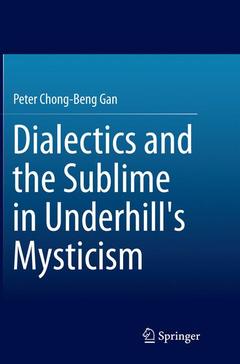Description
Dialectics and the Sublime in Underhill's Mysticism, Softcover reprint of the original 1st ed. 2015
Author: Gan Peter Chong-Beng
Language: English
Subject for Dialectics and the Sublime in Underhill's Mysticism:
Approximative price 52.74 €
In Print (Delivery period: 15 days).
Add to cartPublication date: 10-2016
Support: Print on demand
Approximative price 52.74 €
In Print (Delivery period: 15 days).
Add to cartPublication date: 05-2015
Support: Print on demand
Description
/li>Contents
/li>Biography
/li>Comment
/li>
This book represents a study of Evelyn Underhill?s premier work on mysticism, using Hegel?s dialectics and Kant?s theory of the sublime as interpretive tools. It especially focuses on two prominent features of Underhill?s text: the description of the mystical life as one permeated by an intense love between the mystic and infinite reality, and the detailed delineation of stages of mystical development. Given these two features, the text lends itself to a construction of a valuable discourse predicated on dialecticism, sublimity, and mysticism. The book also articulates a number of insights into the content and nature of the writings of Christian mystics.
Preface and Acknowledgements.- Chapter 1: Introduction.- 1.1: Evelyn Underhill and her foundational text on mysticism.- 1.2: Mysticism: concept, approaches, and the thrust of this study.- 1.3: Writings on and by Underhill.- 1.4: Procedure.- 1.5: The chapters.- 1.6: A note on gender pronouns.- Chapter 2: Being-Becoming.- 2.1: Introduction.- 2.2: Vitalism: transcendence in this world of flux.- 2.3: A general configuration of being, becoming, and infinite being.- 2.4: Being and becoming and the mediating dialectic.- 2.5: Being and becoming and the individualizing dialectic.- 2.6: Transcendence and immanence, and the being-becoming dialectics.- 2.7: Sublimity and the two forms of mystical transcendence.- 2.7.1: The sublime in transcendence as including-exceeding.- 2.7.1.1: Experiencing divine reality as infinite.- 2.7.1.2: Experiencing all finite beings as immersed in infinite reality.- 2.7.2: The sublime in transcendence as excluding.- 2.8: Chapter conclusion.- Chapter 3: Infinity-Finitude.- 3.1: Introduction.- 3.2: Talking about infinity.- 3.2.1: Potential and actual infinities: establishing the contention.- 3.2.2: A synthesis of potential and actual infinities.- 3.3: Dialectical trinity.- 3.3.1: Configuring the relational structure of the trinity.- 3.3.2: Hegel’s infinity and trinity.- 3.4: The problem of objectivity in mystical intimacy.- 3.4.1: Trans subjectivism and mysticism.- 3.4.2: Objective idealism and mysticism.- 3.4.3: Tentative unitivism and mysticism.- 3.5: Chapter conclusion.- 4: Light-Darkness (I).- 4.1: Introduction.- 4.2: A dialectical metaphor.- 4.2.1: Dialectical pairing.- 4.2.2: Dialectical procedure as negation of negation.- 4.3: Mysticism’s stage development: an overview.- 4.4: The dawn of the mystical quest.- 4.4.1: Testimonials on awakening.- 4.4.2: Sublime awakening.- 4.5: The first transformative night.- 4.5.1: Detachment.- 4.5.2: Mortification.- 4.5.3: Dialectical incorporation, universal-particular dialectic, and sublimity.- 4.6: Illumination.- 4.7: Chapter conclusion.- Chapter 5: Light-Darkness (II).- 5.1: Introduction.- 5.2: The second transformative night.- 5.2.1: Dark night and depression.- 5.2.2: Sublimity and the negation of negation.- 5.2.3: Darkness as emptiness.- 5.2.4: Oscillation and co-existence of light and darkness.- 5.2.5: Purification of sense and spirit.- 5.2.6: Mystical death.- 5.3: The Unitive Life.- 5.3.1: Experience of mystical union and the issue of the content of consciousness.- 5.3.2: Union experience versus identity experience.- 5.3.3: The enduring unitive life.- 5.4: Chapter conclusion.- Chapter 6: Conclusion.- 6.1: Sublime beauty and beautiful sublime.- 6.2: Overall summing-up and suggestions for future researches.- References.- Index.
Peter Gan is an academic in the Philosophy and Civilization Section of the School of Humanities at Universiti Sains Malaysia, Penang. In the midst of spending years juggling work and studies he managed to complete a Bachelor of Theology, a Bachelor of Arts (honours), a Master of Social Science and a Doctoral Degree. Peter’s research, publication, and teaching revolve around the discipline of philosophy. To the best of his recollection, his interest in mysticism was first piqued when he just completed high school. For more than a decade now, Peter has been devoting a considerable degree of his energies to the study and investigation of mysticism using the categories and methods contained in the field of philosophy of religion.
Reads mysticism through the lenses of dialecticism and sublimity
Attempts to reconcile the rational and the mysterious within mysticism
Illuminates and elaborates Underhill’s stages of mystical progress
Defends a non-classical conception of God




